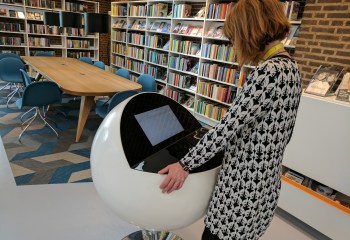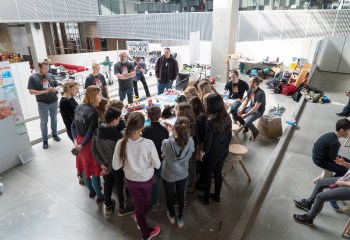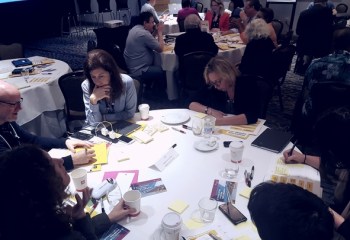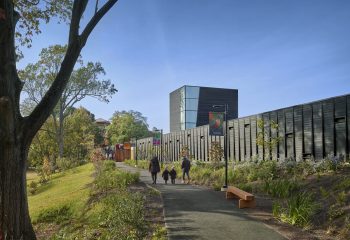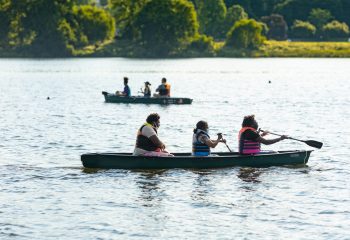Knight Foundation investment ushers in model for innovation, impact and community engagement
(June 28, 2021) — A powerful partnership of industry leaders today announced The Palace Project, a transformational, library-centered platform for digital content and services.
The Palace Project, with a $5 million award from the John S. and James L. Knight Foundation to LYRASIS, and in strategic partnership with Digital Public Library of America (DPLA), will develop and scale a robust suite of content, services, and tools for the delivery of ebooks, audiobooks, and other digital media to benefit public libraries and patrons.
The Palace Project will support the mission of public libraries by providing equitable access to digital knowledge, bolstering the direct relationship between libraries and patrons, and protecting patron privacy by enabling libraries to serve content to patrons from all the major e-content providers.
“LYRASIS sees Palace as an unprecedented opportunity for libraries to be digital leaders within their communities and make all content accessible to all people,” said Robert Miller, LYRASIS chief executive officer. “LYRASIS deeply appreciates Knight Foundation’s vote of confidence in our collective vision. LYRASIS has had a long-term relationship with public libraries and the Knight funding will accelerate efforts and impact for the communities we serve.”
“Libraries are essential because they provide individuals with knowledge and the tools to build more informed, engaged and inclusive communities,” said George Martinez, chief technology officer for Knight Foundation. “The Palace Project will meet people where they are and significantly boost equitable access to knowledge in communities across the country at a time when it is needed most.”
Michele Kimpton, a globally recognized leader in building community-centered library products, will lead The Palace Project. Formerly Director of Business Development and Senior Strategist at DPLA, Kimpton has played a pivotal role in some of the most significant advances in internet-related digital content development and preservation. Kimpton joins LYRASIS as Global Director of The Palace Project Division.
The Palace Project builds on a collaboration between DPLA and LYRASIS over the last several years and uses the Library Simplified platform, an opensource code base originally designed and developed by the New York Public Library.
“DPLA is excited to take our work providing libraries greater control over digital assets to the next level,” said John Bracken, DPLA’s Executive Director. “In partnership with Knight Foundation and LYRASIS, and through Michele Kimpton’s leadership, we are eager to advance our common goal of ensuring equitable access to knowledge for all.”
The Palace Project will enable libraries to deliver content to patrons from all major e-content providers. Knight Foundation’s funding allows for a one-click, turnkey patron experience accessing content ranging from Amazon Publishing, to major publishers and independents, to local authors and open, accessible content. The Palace Project’s app is slated to launch in early fall.
Today’s announcement was made at Knight Foundation’s 2021 Convening on Libraries, which brings together library, civic and philanthropic leaders.
For more information on The Palace Project visit: thepalaceproject.org.
###
About Lyrasis
LYRASIS is a global, non-profit membership organization whose mission is to support enduring access to the world’s shared academic, scientific, and cultural heritage through leadership in open technologies, content services, digital solutions and collaboration with archives, libraries, museums, and knowledge communities worldwide. LYRASIS organizational and staff values are communication, respect, collaboration, impact, and service. For more information visit www.lyrasis.org.
About Digital Public Library of America
DPLA amplifies the value of libraries and cultural organizations as trusted sources of shared knowledge. DPLA fulfills its mission by collaborating with partners to accelerate the adoption of innovative tools and ideas to empower and equip libraries in making public information more accessible. DPLA provides a library-led marketplace and platform to purchase, organize and deliver ebooks and other e-content to patrons. For more information visit www.dp.la.
About the John S. and James L. Knight Foundation
Knight Foundation is a national foundation with strong local roots. We invest in journalism, in the arts, and in the success of cities where brothers John S. and James L. Knight once published newspapers. Our goal is to foster informed and engaged communities, which we believe are essential for a healthy democracy. For more, visit www.kf.org.
Image (top) by Kampus Production on Pexels.

